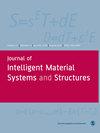Self-switching circuit of TENG for energy storage and power management in harvesting wind energy
IF 2.2
3区 材料科学
Q3 MATERIALS SCIENCE, MULTIDISCIPLINARY
Journal of Intelligent Material Systems and Structures
Pub Date : 2023-09-19
DOI:10.1177/1045389x231195820
引用次数: 0
Abstract
As an important green energy in our life, natural wind energy is widely used in power generation. Triboelectric nanogenerator (TENG) can convert wind energy in the environment into electrical signal. In this study, two independent TENGs in parallel (FHS-TENG) and the power management circuit composed of passive self-switching circuit and LC filter circuit constitute a self-supplying system, which is committed to harvesting wind energy in the environment and outputting stable voltage and improving energy storage performance. The self-switching circuit mainly includes rectifier module, energy storage module, the self-switching module, and filter module. And the on/off state of the passive self-switching is mainly controlled by two transistors, which implements the effect of switch. The results demonstrate that the energy stored by the power management circuit is more than 100 times higher than that of the universal circuit at 100 μF capacitor, and the calculator is in stable working order in simulated wind conditions. This work provides a new strategy for the passive electronic switch of TENG and the improvement of circuit energy storage performance, which is meaningful for the further application and industrialization of TENG.用于风能收集中储能和电源管理的TENG自开关电路
自然风能作为我们生活中重要的绿色能源,被广泛应用于发电。摩擦电纳米发电机(TENG)可以将环境中的风能转化为电信号。在本研究中,两个独立的并网teng (FHS-TENG)和由无源自开关电路和LC滤波电路组成的电源管理电路组成一个自供电系统,致力于收集环境中的风能并输出稳定电压,提高储能性能。自开关电路主要包括整流模块、储能模块、自开关模块和滤波模块。无源自开关的通/关状态主要由两个晶体管控制,实现开关的效果。结果表明,在电容为100 μF时,该电源管理电路存储的能量比通用电路高100倍以上,且在模拟风况下,该计算器工作状态稳定。本工作为TENG的无源电子开关和电路储能性能的提高提供了一种新的策略,对TENG的进一步应用和产业化具有重要意义。
本文章由计算机程序翻译,如有差异,请以英文原文为准。
求助全文
约1分钟内获得全文
求助全文
来源期刊
CiteScore
5.40
自引率
11.10%
发文量
126
审稿时长
4.7 months
期刊介绍:
The Journal of Intelligent Materials Systems and Structures is an international peer-reviewed journal that publishes the highest quality original research reporting the results of experimental or theoretical work on any aspect of intelligent materials systems and/or structures research also called smart structure, smart materials, active materials, adaptive structures and adaptive materials.

 求助内容:
求助内容: 应助结果提醒方式:
应助结果提醒方式:


